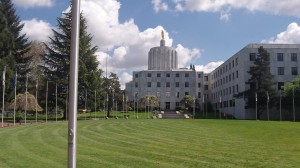The Oregon House Revenue Committee has passed the proposal for a road user tax on vehicles that use little or no motor fuel. But questions remain about this approach, and it’s not obvious that it will become law.

The road user fee bill now goes to the Joint Ways and Means Committee, which sets budgets.
House Bill 2453 cleared the tax committee this morning (Tuesday, May14) by a vote of 6-3. It now goes to the joint budget committee, which may object to the projected $3.1 million setup costs of the program during 2013-15. Then it would have to pass the House by a three-fifths majority because it’s a new tax. Vicki Berger of Salem is one Republican who backs the bill. But it needs more.
Republicans who opposed it in committee were Cliff Bentz of Ontario, Jason Conger of Bend and John Davis of Wilsonville. One of them argued for a simple system of charging a flat annual fee on electric vehicles to make up for the fuel tax they don’t pay (and which pays to maintain our road system). The bill has a flat-fee option, but it’s far too high, based on driving 35,000 miles a year.
For vehicles not paying the annual fee, the bill calls for a tax of 1.55 cents per mile. It calls on ODOT to develop a system of recording and reporting mileage starting with 2015 model cars so owners can pay what they owe. But no such system would be needed if the state opted for a reasonable rather than excessive annual fee that would be simple and cheap to collect. (hh)
Chuck Leland responded on May 16: Don’t know how many of these vehicles ply Oregon roads. But for fun let’s say there are 10,000. And let’s guess they drive average of 15,000 miles a year. At 1.55 cents / mile that would produce tax income to Oregon of $2,323,500 annually. Further it would seem a simple process to add a line to the license renewal form asking opening and closing mileage of the vehicle and have taxpayer calculate the 1.55 cents themselves. It would be an auditable report and probably generate a few more state jobs.
A problem I see is trying to reconcile the gas vs electric use of the hybrids. Maybe a different rate for those cars vs the all electric cars.
Regardless it would be worth spending some money, maybe not 1.3 million, to setup and operate such a program.

Mileage tax clears another hurdle
The Oregon House Revenue Committee has passed the proposal for a road user tax on vehicles that use little or no motor fuel. But questions remain about this approach, and it’s not obvious that it will become law.
The road user fee bill now goes to the Joint Ways and Means Committee, which sets budgets.
House Bill 2453 cleared the tax committee this morning (Tuesday, May14) by a vote of 6-3. It now goes to the joint budget committee, which may object to the projected $3.1 million setup costs of the program during 2013-15. Then it would have to pass the House by a three-fifths majority because it’s a new tax. Vicki Berger of Salem is one Republican who backs the bill. But it needs more.
Republicans who opposed it in committee were Cliff Bentz of Ontario, Jason Conger of Bend and John Davis of Wilsonville. One of them argued for a simple system of charging a flat annual fee on electric vehicles to make up for the fuel tax they don’t pay (and which pays to maintain our road system). The bill has a flat-fee option, but it’s far too high, based on driving 35,000 miles a year.
For vehicles not paying the annual fee, the bill calls for a tax of 1.55 cents per mile. It calls on ODOT to develop a system of recording and reporting mileage starting with 2015 model cars so owners can pay what they owe. But no such system would be needed if the state opted for a reasonable rather than excessive annual fee that would be simple and cheap to collect. (hh)
Chuck Leland responded on May 16: Don’t know how many of these vehicles ply Oregon roads. But for fun let’s say there are 10,000. And let’s guess they drive average of 15,000 miles a year. At 1.55 cents / mile that would produce tax income to Oregon of $2,323,500 annually. Further it would seem a simple process to add a line to the license renewal form asking opening and closing mileage of the vehicle and have taxpayer calculate the 1.55 cents themselves. It would be an auditable report and probably generate a few more state jobs.
A problem I see is trying to reconcile the gas vs electric use of the hybrids. Maybe a different rate for those cars vs the all electric cars.
Regardless it would be worth spending some money, maybe not 1.3 million, to setup and operate such a program.
Tags: House Revenue, mileage tax, per-mile tax, vehicle mileage tax, VMT